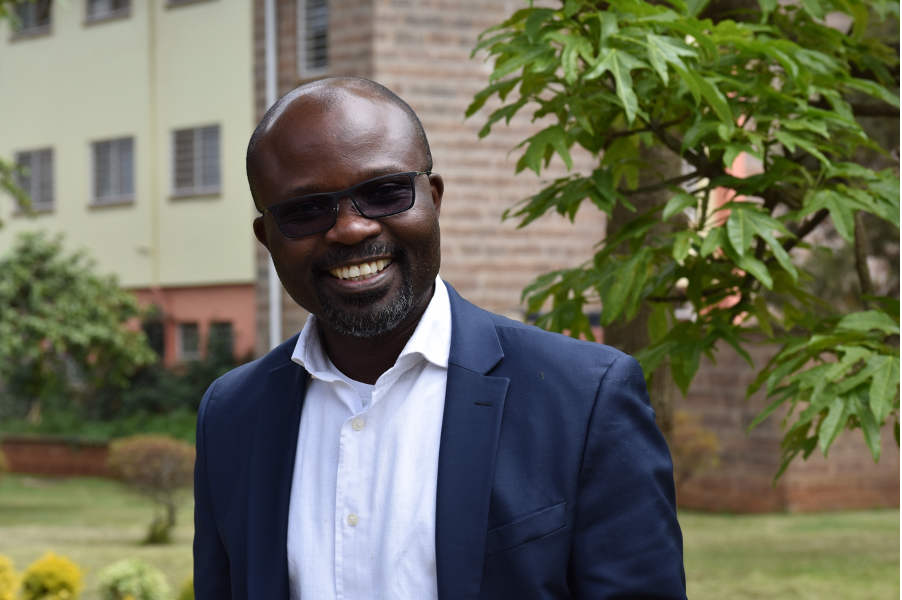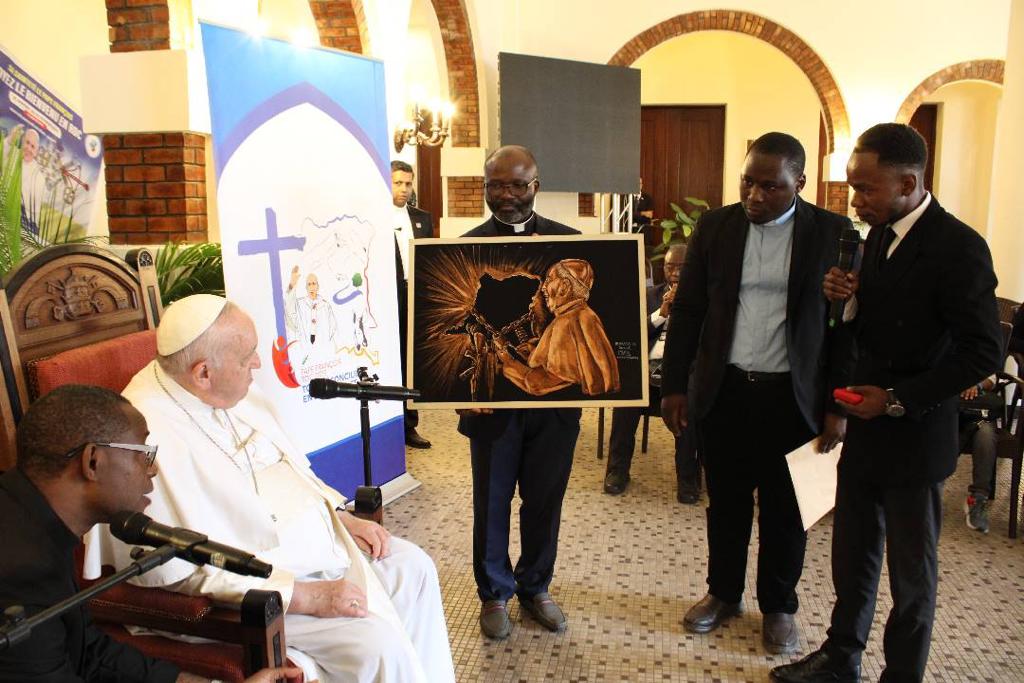
This piece is co-published with the Critical Investigations into Humanitarianism in Africa blog
Pope Francis’s long-awaited trip to the Democratic Republic of Congo and South Sudan finally occurred from January 31 to February 3, 2023. It had been long in the making. On November 23, 2017, the pope had offered a prayer mass for peace in South Sudan and the Democratic Republic of the Congo (DRC). The opening words of his homily were: “In prayer, we want to sow seeds of peace in the lands of South Sudan and the DRC, and in all lands devastated by war.” On November 1, 2022, almost five years after that prayer for peace and reconciliation, Pope Francis gathered African youth from different Catholic universities online for an hour and a half synodal encounter. During that conversation, addressing a question by a Congolese student from Goma, Pope Francis laughed at the rumor that he had gotten scared by the war that broke out near Goma, in the eastern province of North Kivu, where he was supposed to stop during his visit. But he confirmed his resolve to visit both the Congo and the South Sudan in late January and February 2023. Visiting these two countries had obviously been on his mind for a long time. So, finally realizing his desire, Pope Francis brought to the Congolese, as well as to the Southern Sudanese, a powerful message of love, peace, and reconciliation.
The Joy of Welcome
Tens of thousands of people cheered as Pope Francis crossed the city of Kinshasa, a distance that Congolese might take three to four hours to cover on normal days, due to heavy traffic jams. It was a unique moment in the history of the DRC. The last time a pope had traveled to the DRC was in 1985. I was 12 years old. Close to forty years later, Pope Francis had made it happen again. Hence, the emotion of the Congolese nation was expressed along the more than 27 kilometers that his papamobile traveled from Ndjili international airport to the Palais de la Nation where President Felix Tshisekedi was waiting for him. Crowds of faithful Catholics came with flags, drums, whistles, banners, and other instruments to express their joy of welcoming Pope Francis to the DRC. The pope had surely heard of the controversial ban issued by the municipality to prohibit ordinary people from displaying their items for sale along the road on the day of his arrival. The majority of the Congolese people sell small, cheap items, anything really to get by on a daily basis. Contrasting the everyday palpable poverty with this circumstantial euphoria, the pope must have been moved, remembering that crowd that moved Jesus for they were like sheep without a shepherd (Mt 9:36). Except that the ambiance was a celebration of something indefinable.
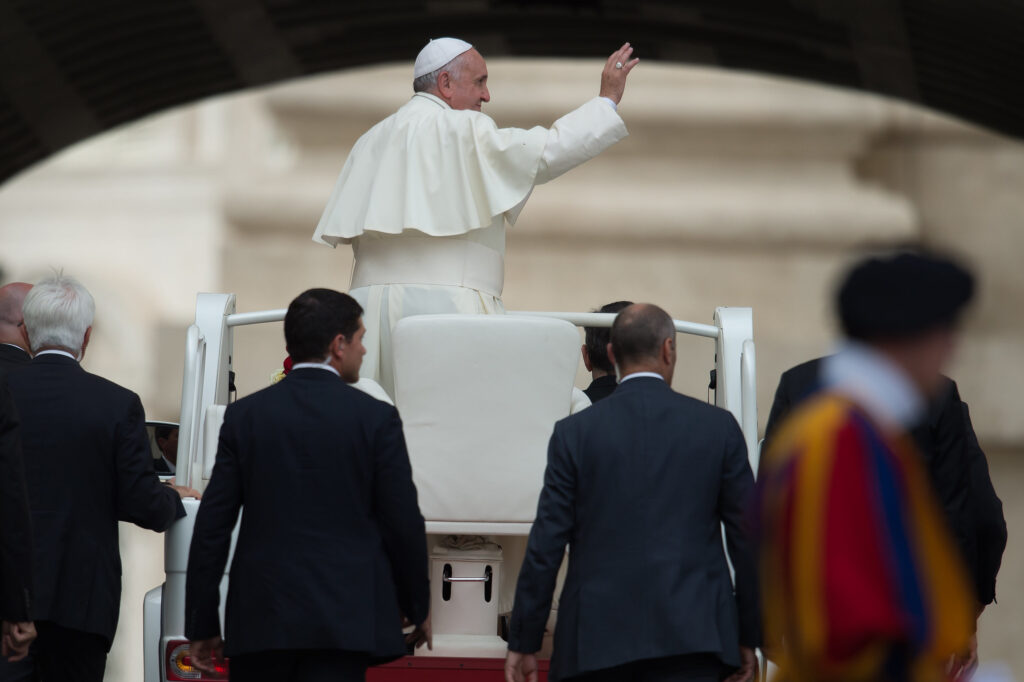
In Goma, however, security conditions had worsened as M23 rebels were fighting for God knows for what. Initially, people believed that this revival of violence in eastern Congo was designed to dissuade the pope from coming. There could be some truth to that. Wars in the DRC are indeed fought at several levels, and the control for the image, the information, and the framing of the issue is something that those with high stakes in the destabilization of the Congo do not intend to lose. Given that the pope’s visit would highlight hard truths about these “fabricated” wars, the resumption of the war in June 2022 was interpreted as a calculated move to bar the pope from traveling to the DRC and by the same token from getting the world to focus on the Congo.
Instead, despite the conflict, the entire Congolese nation was overjoyed when the pope arrived, transcending at least momentarily any differences. He is one of the first global leaders, if not the first, to brave the stereotypes and the danger—imagined or real—of visiting the DRC. The pope’s presence in the Congo was sending the message to the Congolese people that we matter, at least to someone of that importance. Our joy was also an expression of gratitude that someone finally respected us as human beings, treated us as such, and came to visit despite the isolation, bans, and other forms of discrimination that the international community has put on the DRC.
The core message of Pope Francis in the DRC can be summarized in his introductory words in response to Felix Tshisekedi’s welcoming remarks. His audience was composed of members of the government, leaders of the civil society, other religious faiths, as well as diplomatic authorities. He told president Tshisekedi, and through him the Congolese nation, that he had “come to you, in the name of Jesus, as a pilgrim for reconciliation and peace.” Indeed, the motto of his entire trip reads, “All reconciled in Jesus Christ,” which for him, was intended as an expression of love towards all, albeit expressed in Christian terminology, and an indication that his purpose was spiritual and pastoral (rather than political), “I have greatly desired to be here, and now at last I have come to bring you the closeness, the affection and the consolation of the entire Church.” Obviously, Pope Francis understands the role of the “Vicar of Christ” and the mission of the Church as a continuation of Christ’s mission to bring God closer to humanity; that is, to reconcile a sinful and estranged humanity with the Creator. Pope Francis had set out from the Vatican to deliver this message of reconciliation and peace to the Congolese and the South Sudanese whose recent histories have been characterized by wars, violence, and death.
Indeed, since the end of the previous world order characterized by the Cold War and subsequent Cold peace, the Congo has become a theater of neoliberal plunder, where global and regional powers are vying for the control of its vast natural resources. To do so, the sovereignty of the country and its people must be weakened through a ghost army incapable of defending territorial integrity and protecting its own citizens. This state of permanent violence has left many local communities destroyed, millions of women raped, and a nation dazed and confused. Addressing these conditions on a symbolic spiritual level, especially when proposed political solutions have proved ineffective, is also necessary as much scholarship shows.
The Church has to embody the expression of the nearness of God, especially to those who suffer the most, those who are exploited, marginalized, and whose fundamental human dignity is violated and denied. Drawing from the Jesuit outlook since the Second Vatican Council, and the new awareness that ensued in the 1970s about the mission to promote faith that does justice, Pope Francis proclaimed the gospel where it is most needed. The Church in the world ought to take seriously its role of being the “salt of the earth and the light of the world” (Mt 5: 13-16), the yeast that ferments (Mt 13:31-33) the dough of social transformation.
Speaking Historical Truth
Pope Francis had strong words on his arrival, lambasting western powers that continue the colonial regime of plunder and exploitation of natural resources of the Congo at the expense of the Congolese population. In the history of the Congo, the people have been oppressed at different moments by different masters. The Portuguese slave trade in the beginning. Then the late nineteenth century western colonization. And now, a neocolonial system of predation that still operates behind a smokescreen, using proxy Africans who understand very little about how they are not serving the cause of Africa’s emancipation. The Church itself was part, if not the instrument, of this colonial violence. As V. Y. Mudimbe has noted, however, the presence of missionaries also at times helped soften “the harshness of European impact on the indigenous peoples whose lands were invaded and exploited” (45–46). The colonial Church was more socially paternalistic and less politically critical of the colonial brutalities in the Congo. In the 1950s and 1960s, however, as an indigenous clergy was coming of age, and as the theology of inculturation sought to articulate the best way of being authentically African and Christian, the African Catholic Church started addressing the lacunae of the missionary theology by denouncing the deviations of power. Where Belgian missionaries failed to denounce colonial brutalities, for the sake of patriotism, Cardinal Malula became vocal against the abusive power by President Mobutu in the 1970s. In line with a powerful and vocal local Catholic clergy, Pope Francis could echo the struggle of the Conference of Catholic Bishops (CENCO), telling the west:
… this country [the DRC] and this continent [Africa] deserve to be respected and listened to; they deserve to find space and receive attention: Hands off the Democratic Republic of the Congo! Hands off Africa! Stop choking Africa: it is not a mine to be exploited nor a terrain to be plundered. May Africa be the protagonist of its destiny! May the world acknowledge the catastrophic things that were done over the centuries to the detriment of local peoples, and not forget this country and this continent. May Africa, the smile and hope of the world, count for more. May it be spoken of more frequently, and have greater weight and representation among nations!
Pope Francis reminded the Congolese people that our lives are more precious than all the diamonds that can be extracted from our land. He then met with survivors from the war-torn eastern part of the country, and he condemned the massacres, the rapes, and the destruction of villages. Indeed, these first words of Pope Francis on Congolese soil were very moving, very refreshing, and very significant. I do not recall any leader of such stature addressing the Congolese people with such kindness, respect, love, and compassion. Never before had a leader of the world shown that much empathy and consideration toward the Congolese. And more important, no one has acknowledged the efforts of the Congolese people like Pope Francis to pull the nation together, and to dream of a future that is more humane and more dignifying.
A Personal Audience
On the second day of the pope’s visit, after meeting with the youth and catechists at the stadium, he gave a private audience to some 40 young people from the Catholic Universities in the country. He had already met with some of them online on November 1, 2022. During that meeting, the young people handed a memo to the pope in which they requested that he amplify their voice in the international community by asking for a special penal tribunal for the crimes committed in the Congo. They also requested that Pope Francis speak to Congolese authorities to release prisoners whose cases have not received justice.
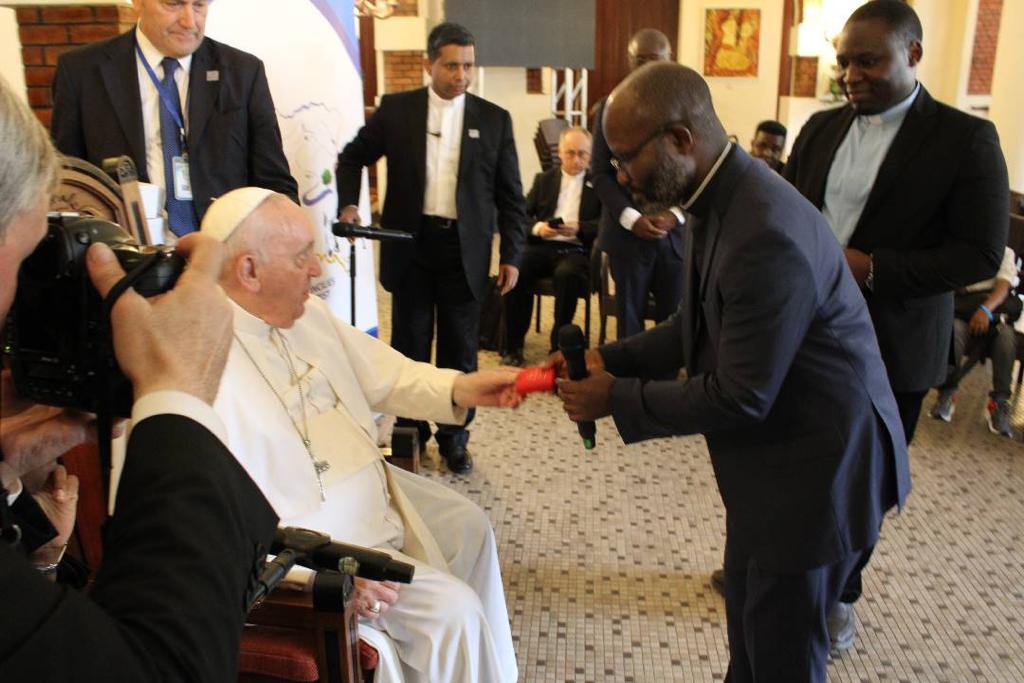
In turn, the pope told the students some profound truths about what it means to live a meaningful life. “Your life must be rooted in love,” he told them. “Without love, life is meaningless.” He went on to explain the three kinds of love that are absolute and non-negotiable. The first type concerns the love of God, the second the love of one’s own mother, and the third is the love of one’s homeland. Strange! Isn’t it? Pope Francis elevated the love of one’s motherland on a par with the love of God and the love of one’s mother. Obviously, this is a subversive understanding of the Torah, which states the love of God to be first and of the neighbor to be second (see also, Mt 22:37-39). Equally important, adds the pope, is the civic love for one’s motherland, which includes protection of the environment and improvement of social arrangements towards greater justice. Extrapolating the religious and biblical importance of the love of God and of one’s parents (as progeny and identity come through the mother’s role as the one who gives birth and the one who looks after the education of the children), Pope Francis introduces this third element which consists of the love of the motherland. This is extremely symbolic, especially in the context of the Congo, a land that is violated and betrayed even by its own sons and daughters. It was unheard of before that patriotism could match spiritual love.[1]
Now we have a tryptic of love entailing the religious love of God, the cultural love of one’s mother, and the civic love that nurtures the responsibility to fulfill the common good in politics. Indeed, Pope Francis was simply reaffirming what he already said in several places, that though often denigrated, “politics remains a lofty vocation and one of the highest forms of charity, inasmuch as it seeks the common good. We need to be convinced that charity “is the principle not only of micro-relationships (with friends, with family members or within small groups) but also of macro-relationships (social, economic and political ones). I beg the Lord to grant us more politicians who are genuinely disturbed by the state of society, the people, the lives of the poor!” (Evangelii Gaudium, para. 205, the emphasis is mine). That tryptic of love is the secret to living a meaningful life with God and the ancestors within one’s homeland. Of course, this love for the homeland cannot be reduced to nationalistic chauvinism that excludes others, especially foreigners.
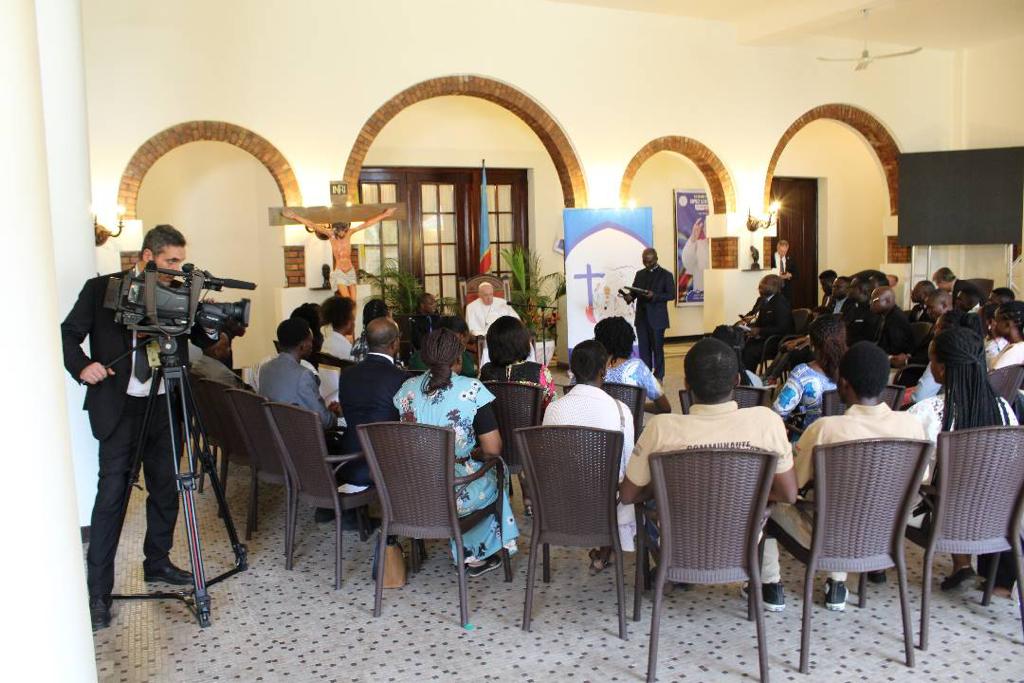
Pope Francis had, indeed, understood the drama of the Congolese people as the result of a system of plunder, violence, and subjugation that was set in place since the early encounter with the west. But he also reminded the young Catholics in this private and intimate conversation that the Congolese too bear responsibility for what is happening to the country. In fact, letting others get involved either as saviors of your situation (i.e., the East African Community) or the crux of the problem (Rwanda and Uganda) is the first indicator of that national irresponsibility. In other words, the degree of blame for what is happening is shared between the Congolese elite and those foreign predators who have a stranglehold on the Congo’s resources. Selling out and prostituting one’s motherland is as sinful as betraying the “absolute love” of God and of the mother. In other words, genuine love for one’s country can open young people up to political careers, which, if done with love, becomes the highest form of charity.
Congolese Beauty; Congolese Hospitality
Pope Francis had set the tone for his message to the world from Congolese land on the very day of his arrival in Kinshasa. At the Palais de la Nation, he defined the framework within which he sought to relate to the Congolese situation on the ground. Neither a confrontation nor a denunciation, but rather a proclamation. About the beauty of the country. Its ecosystem. It’s natural wealth. Despite being a jewel of the earth, a diamond for the world, the diaphragm of Africa, the history of the Congo has been and still is harsh on its people. As a prophet, the pope reminded the Congolese people to embody the spirit of the national anthem: “to build through hard work . . . a country more beautiful than ever before, and in peace.” The pope reminded these authorities of what he saw. “In the case of this people, one has the impression that the international community has practically resigned itself to the violence devouring it.”
Pope Francis’s effect is an important revival of our way of being Christians in the 21st century. Pope Francis has amazed the world because he has helped us, in the last 10 years of his papacy, to think of religion differently. It’s not a set of moral rules and principles to be observed. Religion—like every form of education for that matter—is about training and reforming consciences. It’s about being present to one’s time and getting involved to change the world. He is aware of the wounds inflicted by the Church on humanity, both during colonization and today. His campaign, therefore, is also to reconcile the Church with its own past, which necessarily calls for humility. Pope Francis, for instance, also surprised the world by stating that the Vatican was willing to return stolen indigenous artifacts to their rightful communities.
As far as his trip and message to the DRC are concerned, I believe he spoke in front of the world to amplify the hushed voices of the marginalized. He noted, “We cannot grow accustomed to the bloodshed that has marked this country for decades, causing millions of deaths that remain mostly unknown elsewhere. What is happening here needs to be known. The current peace processes, which I greatly encourage, need to be sustained by concrete deeds, and commitments should be maintained.” In public opinion and social media, the Congolese people showed that they felt vindicated that someone of that stature, an important international leader, finally spoke the truth about their predicament. They experienced the closeness of a powerful leader who not only denounced the western political hypocrisy but also acknowledged the African human worth and authentic spiritual wisdom.
[1] For many years, indeed, if not millennia, the Pauline theology that our citizenship is in heaven (Philippians 3:20) and that we should yearn for and worry about heavenly things is also slowly changing in interpreting social realities. I wouldn’t go as far as to say that Pope Francis’s invitation to patriotic love has a closeness in tone with the Weberian argument that the Protestant ethic potentially bolstered Christians to attend to this-worldly business. Nevertheless, Pope Francis’s background in Latin America and liberation theology might explain his attitude towards politics, society, and the love of one’s motherland as a spiritual commitment.

